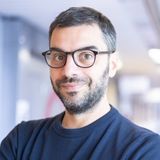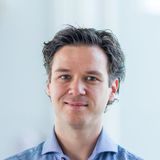
Background
Abnormal and postmenopausal uterine bleeding are common symptoms; about 10% of these patients have endometrial (pre)malignancy. Pathologists diagnose this by microscopically assessing endometrial biopsies, a cornerstone of treatment planning. This involves detecting patterns, estimating proportions, and reporting. Currently, high workloads (over 2,000 biopsies annually at Radboud University Medical Center (Radboudumc) and the Jeronimus Bosch Ziekenhuis (JBZ)) and interobserver variability due to low tissue yield are significant challenges. When tumors are found, assessment requires grading, typing, and molecular classification, which can be expensive and often not beneficial for low-risk EC. We recently developed ENDOmetrial biopsy Artificial Intelligence assisted Diagnosis (ENDO-AID), an AI algorithm proof-of-concept that differentiates benign from (pre)malignant histology, to aid pathologists and gynecologists in diagnosis and treatment. In this project, we will advance ENDOI-AID to its next level.
You will join a multidisciplinary team of AI experts, pathologists and gynecologists working across JBZ and Radboudumc. In this project, you will primarily be located in the Radboudumc Computational Pathology Group to build novel AI models for automated detection, diagnosis and grading of endometrial pathology biopsies, focusing on the following objectives: 1) Build and curate a large multi-centric (digital) collection of endometrial biopsies, including clinical, molecular and follow-up data. 2) Build ENDO-AID 2.0 to: a) Differentiate between benign and (pre)malignant histology when trained with larger multi-centric data, compared to the previous ENDO-AID model. b) Recognize tumor grade and histological type. c) Predict oncological outcome such as patient survival. d) Predict molecular subtype. e) Validate the updated model in external international cohorts.
Tasks and responsibilities
- Work with weakly- and self-supervised learning techniques to build AI models for detection and classification of endometrial biopsies with large-scale training data.
- Develop AI techniques to build a computer-aided diagnosis system to support pathologists in detection and classification of biopsies.
- Develop AI techniques to predict the molecular status of endometrial cancer (e.g., POLE mutated, MSI-H, p53 aberrant and NSMP).
- While addressing these questions, investigate the effectiveness of both publicly available and in-house developed foundation models for pathology.
- Join a multidisciplinary team across JBZ and Radboudumc, with a specific focus on computational pathology.
- Collaborate with pathologists and (inter)national researchers to validate your developed algorithms in large cohorts.
- Have fun interactions with colleagues, present at local and (inter)national conferences, and develop yourself as an independent researcher.
Profile
You are a creative and ambitious researcher with an MSc degree in Technical Medicine, Biomedical Sciences, Data Sciences or similar, with a clear interest in artificial intelligence and medical image analysis. We also welcome applications from individuals with a medical degree and (demonstrable) experience with programming and/or AI. Good communication and organizational skills are essential. Experience with deep learning and programming, preferably in Python, should be evident from the (online) courses you have followed, your publications, GitHub account, etc. Experience with histopathology and proficiency in Dutch language are a plus.
What do we offer?
- A challenging work environment at two major hospitals and one of the largest European research groups in Computational Pathology.
- A four-year contract for 36 hours per week.
- Grading in job category 50 with a salary between €3,329 and €4,723 (based on a 36-hour workweek).
- Year-end bonus and 8.33% holiday allowance.
- Travel allowance.
Organisation
The Jeroen Bosch Hospital is a topclinical hospital with 648 beds and over 4.500 employees. We stand for Positive Health, and our care is aimed at improving health and well-being of the people living in our region. This of course includes our employees. You can read more about our strategy in the JBZ magazine. At the department of Gynecology & Obstetrics we specialize in a wide variety of conditions, caring for women in every stage of life. We have expertise in all subspecialties (oncology, obstetrics, fertility, urogynecology and general gynecology) and collaborate with many different health providers, like pathologists, surgeons, urologists, (intervention) radiologists, physiotherapists, and dieticians.
The Computational Pathology Group (CPG) is a research group of the department of Pathology of the Radboud University Medical Center (Radboudumc). The group develops, validates and deploys novel medical image analysis methods, usually based on the newest advances in machine learning with a focus on computer-aided diagnosis (CAD). Application areas include diagnostics and prognostics of breast, colon, prostate and lung cancer. Our group is among the international front runners in the field, witnessed for instance by the highly successful CAMELYON, PANDA and TIGER grand challenges which we organized. The CPG is also part of the cross-departmental Diagnostic Image Analysis Group (DIAG) at Radboudumc, with researchers in the departments of Radiology and Nuclear Medicine, Pathology, Cardiology, Radiotherapy and Neurology.
Employment conditions
Upon commencement of employment we require a certificate of conduct (Verklaring Omtrent het Gedrag, VOG) and there will be, depending on the type of job, a screening based on the provided cv. Radboud university medical center’s HR Department will apply for this certificate on your behalf.
Read more about the Radboudumc employment conditions and what our International Office can do for you when moving to the Netherlands.
Application
You can apply for this position via the JBZ website at this link, before November 10, 2025. Would like to know more about the poisition? Please contact francesco.ciompi@radboudumc.nl and l.v.d.putten@jbz.nl. Job interviews will be done in November - early December 2025. We aim at starting the project in January 2026.




